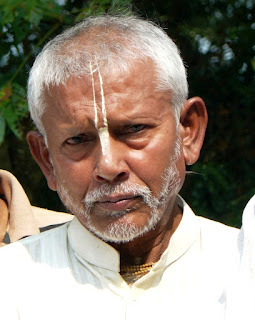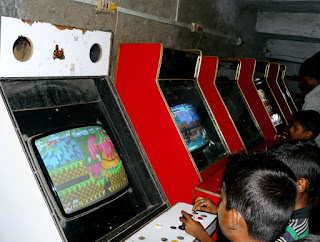We had the opportunity to visit some Dutch funded projects in the south-west of Bangladesh.
The Dutch aid is focused on the south-west because the problems here are closest to those in The Netherlands and we are good at solving. This area has some big problems. If Bangladesh were rich enough it would build big dykes not unlike the 'Delta werken' in The Netherlands. The floods make the fields saline, nothing grows on this, it can only be used for shrimp cultivation. Shrimp cultivation is in the long term not very sustainable. Further the salt water makes the shallow ground water salty and undrinkable.
The rivers should give some counter pressure to the sea, but mainly India uses o.a. the Ganges for irrigation and hydro electricity.
This is a very short and far from complete summary, but it might give you an idea of what we are working on.
First we had a look at Cordaid's programme to help the disaster victims and help them prepare for future disasters. This area gets almost yearly cyclones which often kills many people.
After a cyclone there are multiple problems, fields are flooded with salt water and all the belongings are gone. Part of the programme is to build better foundations for the houses and cyclone shelters and a warning system.
After that we saw a WASH (WAter Sanitation and Hygiene) programme, teaching people to wash hands after going to the toilet. Providing toilets, some with grants, others with loans. Making sure there is enough drinking water for everyone. The goal is one toilet per household, they are on the way there.
Last but not least we saw the WASH programme from BRAC, paid by the Dutch Embassy. This is a huge programme, with a huge NGO (Non-Governmental Organisation). Key is not just providing the toilets, but involving the community and making sure there is a system of payment for water so maintenance can be paid for and teaching about hygiene. People see the number of ill people go down, mainly diarrhea, so they wash their hands. A shame that arsenic is not detectable by taste, the shallow pumps often have arsenic in the water. Deep wells are needed or water from a pond and then filtered.
I will try to explain it using photos
Unfortunately I can not put all 600 photos here.
 People have to live on the dykes because the fields are flooded. We walked through very sticky and slippery mud.
People have to live on the dykes because the fields are flooded. We walked through very sticky and slippery mud.
In exchange for nice photos we are the subject of several pictures.
Spot the Dutchie
A cyclone shelter. This building serves as school in normal live and when there are cyclone warnings people are warned and come here for shelter.
Part of the programme is to teach people to bury their precious belongings in plastic at warning level 2, level 3 means "go to the shelter."
Crowd watching a rescue exercise
ZZ-over-the-top
So cute!
We love the faces of the senior men
Part of the warning system
A girl school got given a toilet, they put some extras in themselves and keep it clean, impressive commitment.
She was just overwhelmed
A very old mosque with about 70 domes, so they call it the 60 domes mosque, don't ask. It's a world heritage site, and there aren't many of those standing here.
A smile worth millions
Donkey Kong
A sand filter pump. You pump the water from the pond in the top, it goes through 5 sand filters 'et voila'.
Dental care is not in this programme.
Snails are fed to the sweet water shrimps, the shells go to poultry.
Poo on a stick. Cow dung dries in the sun to use as fire fuel for cooking.
A well pump.
Red spout means there is arsenic in the water that comes out of here, so not for consumption.
A WASH (WAter Sanitation and Hygiene) committee meeting. Bi monthly these representatives from the community meat to discuss sanitation and hygiene (washing hands, toilet maintenance)
The village is mapped where the wells and toilets are, who is poor, ultra poor or not so poor. The committee decides who is poor following a checklist and when they get a toilet. The ultra poor get a gift, the poor a interest free loan and others have to pay for it themselves.
Welcome at the girls school.
Sorry about the turned pictures, not sure how to correct this.
I failled to mention that we had lovely food, no pictures as we were too busy eatting. The shrimps are the best in this world, huge and taste, come and try.
The Dutch aid is focused on the south-west because the problems here are closest to those in The Netherlands and we are good at solving. This area has some big problems. If Bangladesh were rich enough it would build big dykes not unlike the 'Delta werken' in The Netherlands. The floods make the fields saline, nothing grows on this, it can only be used for shrimp cultivation. Shrimp cultivation is in the long term not very sustainable. Further the salt water makes the shallow ground water salty and undrinkable.
The rivers should give some counter pressure to the sea, but mainly India uses o.a. the Ganges for irrigation and hydro electricity.
This is a very short and far from complete summary, but it might give you an idea of what we are working on.
First we had a look at Cordaid's programme to help the disaster victims and help them prepare for future disasters. This area gets almost yearly cyclones which often kills many people.
After a cyclone there are multiple problems, fields are flooded with salt water and all the belongings are gone. Part of the programme is to build better foundations for the houses and cyclone shelters and a warning system.
After that we saw a WASH (WAter Sanitation and Hygiene) programme, teaching people to wash hands after going to the toilet. Providing toilets, some with grants, others with loans. Making sure there is enough drinking water for everyone. The goal is one toilet per household, they are on the way there.
Last but not least we saw the WASH programme from BRAC, paid by the Dutch Embassy. This is a huge programme, with a huge NGO (Non-Governmental Organisation). Key is not just providing the toilets, but involving the community and making sure there is a system of payment for water so maintenance can be paid for and teaching about hygiene. People see the number of ill people go down, mainly diarrhea, so they wash their hands. A shame that arsenic is not detectable by taste, the shallow pumps often have arsenic in the water. Deep wells are needed or water from a pond and then filtered.
I will try to explain it using photos
Unfortunately I can not put all 600 photos here.
 |
| A warm welcome with Dutch and Bangladeshi flags and banners in Dutch and English without spelling mistakes. |

In exchange for nice photos we are the subject of several pictures.
Spot the Dutchie
A cyclone shelter. This building serves as school in normal live and when there are cyclone warnings people are warned and come here for shelter.
Part of the programme is to teach people to bury their precious belongings in plastic at warning level 2, level 3 means "go to the shelter."
Crowd watching a rescue exercise
ZZ-over-the-top
So cute!
We love the faces of the senior men
Part of the warning system
A girl school got given a toilet, they put some extras in themselves and keep it clean, impressive commitment.
She was just overwhelmed
A very old mosque with about 70 domes, so they call it the 60 domes mosque, don't ask. It's a world heritage site, and there aren't many of those standing here.
A smile worth millions
Donkey Kong
A sand filter pump. You pump the water from the pond in the top, it goes through 5 sand filters 'et voila'.
Dental care is not in this programme.
Snails are fed to the sweet water shrimps, the shells go to poultry.
Poo on a stick. Cow dung dries in the sun to use as fire fuel for cooking.
A well pump.
Red spout means there is arsenic in the water that comes out of here, so not for consumption.
A WASH (WAter Sanitation and Hygiene) committee meeting. Bi monthly these representatives from the community meat to discuss sanitation and hygiene (washing hands, toilet maintenance)
The village is mapped where the wells and toilets are, who is poor, ultra poor or not so poor. The committee decides who is poor following a checklist and when they get a toilet. The ultra poor get a gift, the poor a interest free loan and others have to pay for it themselves.
Welcome at the girls school.
Sorry about the turned pictures, not sure how to correct this.
I failled to mention that we had lovely food, no pictures as we were too busy eatting. The shrimps are the best in this world, huge and taste, come and try.
















































